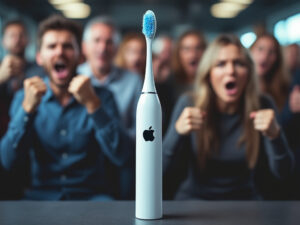 The Rise of Influencer Marketing
The Rise of Influencer Marketing
Influencer marketing has become the go-to strategy for brands looking to capture the attention of digital-savvy consumers. By partnering with popular YouTubers and social media personalities, companies aim to create a sense of trust and authenticity around their products. But what happens when this strategy goes too far?
It started as a way for brands to connect with their audience on a more personal level, but it’s really hit a tipping point. These days, it feels like every other video or social media post is sponsored, and that authenticity that made influencer marketing so effective is getting lost. When influencers promote anything and everything, it starts to feel more like an infomercial than genuine content.
It can be overwhelming, and honestly, it makes me tune out. I think the worst part is when a brand overdoes it with too many influencers at once—it just feels desperate. When everyone is pushing the same product (even on the same day), it creates skepticism rather than trust. Laifen’s recent campaign for their so-called “Apple Toothbrush” is a prime example of influencer marketing gone wrong.
The “Apple Toothbrush” That’s Not From Apple
If you’ve been on YouTube or social media lately, you’ve probably come across Laifen’s Wave electric toothbrush. Billed as the “Apple Toothbrush”—a name that has nothing to do with Apple—the product has been pushed relentlessly through influencer sponsorships. After seeing just a couple of these videos, I knew I wanted nothing to do with the product. It’s everywhere, and frankly, it’s nauseating.
Why are so many influencers calling it the toothbrush that Apple made (but didn’t)? It’s all part of the paid influencer campaign. Apple has never made a toothbrush, and never will. The only consumers who fall for this hype—believing that it’s on par with an Apple product—are either misled by the marketing or are willing to compromise their judgment for the sake of a trendy endorsement.
This over-saturation makes me question the company’s marketing strategy. It feels as though Laifen has thrown their entire marketing budget at influencers, with little regard for the long-term impact on their brand. It’s as if 100% of their budget went to YouTube and social media, leaving nothing for more traditional, less invasive advertising.
The Problem with Over-Saturation
So why is this a problem? Too much of anything is never good. When a brand relies too heavily on influencer marketing, it risks turning off potential customers. This kind of marketing blitz can lead to consumer fatigue, where people become so inundated with promotional content that they start to tune it out—or worse, develop a negative association with the brand.
This is exactly what happened with me and Laifen. Instead of convincing me to buy their toothbrush, their relentless sponsorships pushed me away. And I’m not alone. Many consumers are starting to feel the same way, growing increasingly skeptical of influencer endorsements that feel more like forced advertisements than genuine recommendations.
Impact on Consumer Trust
One of the most damaging effects of this over-saturation is the erosion of consumer trust. When a massive 24M subscriber YouTube channel like Unbox Therapy, known for covering tech gadgets, suddenly produces a dedicated video for an electric toothbrush, it raises eyebrows. This type of content feels out of place and forced, leading viewers to question the authenticity of the endorsement. How much did Laifen pay to make this happen? And if they had to pay so much, is the product really that good?
These are the kinds of questions that run through a consumer’s mind, ultimately undermining the trust that influencer marketing is supposed to build.
The Reality Behind the Hype
Let’s put Laifen’s product to the test against something more established. I’ve been using a Sonicare electric toothbrush for years, and it outshines what Laifen offers in almost every way. I can vouch for its effectiveness—I’ve never had a cavity or any dental issues. The Laifen toothbrush isn’t revolutionary; it’s just another product being pushed as something it’s not. This only reinforces the idea that heavy marketing doesn’t equal better quality. Heard of snake oil? If you want an electric toothbrush there are far better out there from Sonicare, Oral-B, and many others.
Now, imagine how this all came together. Laifen, a Chinese company founded in 2019 by Hongxin Ye—a self-described visionary creative geek—had an idea for a new toothbrush that, in my opinion, was average at best. It’s possible that, rather than relying on the product’s merits, they pitched the concept to heavy-hitting investors by promising massive success with the right financial backing. With $6 million secured from Series A investors, most of that money seems to have been funneled into influencer marketing campaigns, creating a buzz that far outstrips the actual quality of the toothbrush.
A Call for More Genuine Marketing
The Laifen “Apple Toothbrush” saga is a textbook example of how not to do influencer marketing. By pushing too hard, they’ve alienated potential customers and damaged their brand’s reputation. Companies need to find a better balance in their marketing strategies, mixing influencer campaigns with more traditional advertising to avoid overwhelming consumers. At the end of the day, authenticity is key. If a product is genuinely good, it shouldn’t need to be shoved down our throats to sell.
The industry needs to take note—because right now, nobody’s talking about the negative side of influencer marketing. But they should be.
When Marketing Backfires: Your Thoughts?
What’s your take on all this? Are you as disgusted by Laifen and others like them—yes, I’m talking to you, Squarespace, UGREEN and Grovemade—where their relentless marketing strategy has completely backfired? Have you reached the point where you want nothing to do with these brands or any of their products, simply because of the overwhelming influencer hype? It seems that instead of building trust, these companies are alienating the very consumers they’re trying to reach.
Marketing should enhance a product, not overshadow or distort it. But when it crosses the line into over-saturation, it does more harm than good. So, how do you feel about brands that bombard you with influencer endorsements? Does it make you more likely to buy, or does it push you away, as it has with me? I’d love to hear your thoughts. Let’s start a conversation in the comments below.
Discover more from Chris Duke
Subscribe to get the latest posts sent to your email.

Leave a Reply